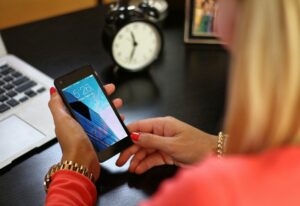 Smartphones have probably done more to change the way we work, live and communicate than any other technology over the last decade. The average American is now carrying more computing power in their pocket than the whole of NASA employed while landing the Apollo astronauts on the moon. But as we live more of our lives through our devices we are faced with the prospect of safeguarding our data and privacy. Here are some basic tips to keep you and your information safe:
Smartphones have probably done more to change the way we work, live and communicate than any other technology over the last decade. The average American is now carrying more computing power in their pocket than the whole of NASA employed while landing the Apollo astronauts on the moon. But as we live more of our lives through our devices we are faced with the prospect of safeguarding our data and privacy. Here are some basic tips to keep you and your information safe:
Physical Security First
Maintain a routine place where you carry your phone (Always in your right pants pocket, middle purse pocket, etc.) so you are less likely to misplace it. Don’t leave your phone on the table at restaurants or coffee shops when you use the restroom. Buy a quality case for your phone so it isn’t at risk of breaking when dropped.
Check Your Wireless Settings
Ensure that your phone is not set to connect to any available unsecured wireless or Bluetooth networks it encounters. Unsecured networks can be used to perform “Man in the middle” attacks to capture your data as it passes through the network.
Lock It Up
Be sure to lock your phone with a passcode or gesture pattern, so if your device is lost or stolen your data is secured.
Getting It Back
App writers have tackled the problem of what to do if your phone falls into someone else’s hands. Some apps allow you to turn on GPS tracking remotely or wipe your data if you suspect it has been lost or stolen. A few applications (one built into some of the newest iPhones) will use the front-facing camera to take a picture of the individual who enters the wrong passcode while trying to unlock the phone, then upload that image to the cloud.
Know What You’re Downloading
Only download apps from the app store that have high ratings and be sure to check out the review section. Anyone can upload an app to the Android store, but crowdsourcing is surprisingly effective and poor quality or nefarious apps are normally sussed out quickly by reviewers.
Shop Safe
If you use your mobile device to do any shopping or other financial activity, only do so on trustworthy home or office wireless networks and be sure to sign out of your account when you’re done. If you do any online shopping, mobile or otherwise, it’s always a good idea to check your accounts daily for any suspicious activity.
Back Up Your Data
The age old gold standard advice for all electronics is to backup, backup, backup. Most Mobile platforms come with a program or service to back up your crucial data in the cloud. Be sure you are logged in and using a backup service before your phone is lost or damaged.